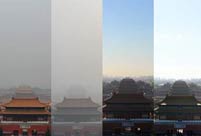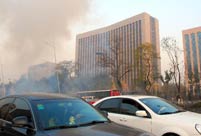TOKYO, Nov. 9 -- Areas such as Tokyo's Shin-Okubo and Osaka's Tsuruhashi districts are home to hundreds of Korean restaurants, shops and businesses and thousands of residents, meanwhile, unfortunately, also are the receiving end of ultra- nationalist and their hate speeches here in Japan.
However, it would appear of late that both the intensity and frequency of these well-organized anti-Korean protests are increasing, as are the levels of hatred, bellicose, sheer viciousness and implied violence contained in the rally cries and written on hundreds of placards carried by the nationalists during the heavily policed protests.
The anti-Korean protests and hate speeches are being organized primarily by the ultra-nationalist group Zaitokukai, a self- claimed "citizens" group that will not tolerate special privileges being given to Korean and Chinese residents in Japan.
"The Zaitokukai, which led by the infamous Makoto Sakurai who was arrested along with eight of his cohorts recently for a physical altercation with a Korean during a recent protest, believe that some Koreans, known as 'Zainichi Koreans' are being given special legal rights by the government to integrate them into Japanese society," political analyst Teruhisa Muramatsu told Xinhua.
"The group objects to the fact that Koreans can use Japanese names here so that if they were to commit a crime, for example, on the news or in the newspapers the offender would come across as being Japanese. Zaitokukai also vocally oppose those long-term Koreans who have been given permanent residence status by the Ministry of Justice and as such are eligible to claim welfare benefits, the same as Japanese citizens," Muramatsu added.
He went on to concur that instances of hate speeches were on the rise and the potency of the speeches was becoming particularly worrying to the point he suggested that a national debate on the issue be called and Prime Minister Shinzo Abe resolve to imminently tackle the frequent issue of hate speeches and protests that constantly threaten to spill over into violence.
Abe said himself in a recent briefing on the matter that the anti-Korean abuse heard on the streets of Tokyo, Osaka, and other cities had severely dishonored Japan. He stated that the speeches are entirely regrettable and that the Japanese people are a people of peace and harmony and as such should never exclude others.
A prominent lawyer on the subject, Yasuko Morooka, highlighted at a recent antiracism symposium that the notion of "freedom speech in Japan" is increasingly be confused with having the right to say anything you want, anywhere you want, including making racist comments or hate speeches.
If the situation of such venomous racism is not addressed by the government, then hate speeches will continue to grow in violence and frequency and this will spark racial hostilities and trigger violence against ethnic minorities here in Japan, the lawyer suggested.
But acceptance and generosity towards foreigners, as Abe proffered as being at the core of Japanese consciousness, are certainly not the experiences of some workers and residents in Tokyo's Shin-Okubo area, where hate speeches can occur as often as twice a week.
"Go home Koreans! You don't belong here!" read one banner, also emblazoned with Japan's Imperialist flag, a prevalent reminder of Japan's World War II militarism. "Stop stealing our taxes!" read another during a recent anti-Korean protest in Shin-Okubo. "You are all criminals!" read another.
"These rallies are coming here more and more often and its driving our patrons away and scarring our children who were born in Japan," said restaurant chain owner Sim Jung-hee, who speaks fluent Japanese.
"The numbers of protesters are getting larger and I think they not just related to Zaitokukai, but seem to be regular people as well, who seem to be frustrated with us Koreans living and working here for some reason," said Sim.
The shopkeeper said that of late two or three hundred protesters were gathering for the hate speech events and the words being shouted were becoming increasingly violent and often drew comparisons with Koreans and cockroaches and lesser human species and criminals; called for "Holocaust"-like scenarios to get rid of the Koreans and, perhaps most worryingly, contained numerous, unfeigned death threats.
"It makes no sense to me, all my customers are Japanese, we're one of the most popular Korean restaurant chains in Japan and everyone loves our food. Our prices are reasonable and I pay my taxes. Surely I'm providing a service to Japan? But all I get in return is abuse," Sim told Xinhua.
"There's a difference between a 'hate crime' and a 'hate speech ' in terms of Japanese law," explained Muramatsu. "Whereas a hate crime can be punishable as such those who make hate speeches can do so with absolute impunity and the government must crack down on such acts of discrimination."
But human rights groups here who have been calling for legislation to curtail instances of hate speeches, have seen their efforts gain little traction in parliament.
According to a recent survey of attitudes toward discriminatory language among more than 700 Japanese lawmakers, only 46 of those polled had an interest in the topic, despite the fact that Japan has been a signatory to the United Nations International Convention on the Elimination of All Forms of Racial Discrimination since the mid-1990s.
"It would appear that despite the escalation of hate speeches in Japan and general discrimination towards ethnic minorities, the government is not looking to prioritize the introduction of domestic hate-speech legislation," Muramatsu said.
Japan is home to an estimated 600,000 ethnic Koreans, many of whom are the descendants of the nearly 800,000 Korean workers forcibly brought to Japan during Japan's colonial occupation of the Korean Peninsula in WWII from 1910-1945.
"Japan is my home. I was born here, went to elementary, junior high school and high school here and now I'm studying Economics at Waseda University," said Minami, a Japanese national of Korean parentage, opting to use her official Japanese first name.
"Most of my friends are Japanese and I 'feel' more Japanese than I do Korean," the 19-year-old explained in perfect Japanese. "I just don't understand why there's such hatred towards us. After all, if you look at history, it wasn't our choice to come here in the first place, but regardless of that, for my generation, this is home and we're proud to be here," she said.
The protests and hate speeches have escalated in severity as tensions with Japan's neighbors continue to sour over ongoing territorial conflicts, Muramatsu pointed out. Japan is currently embroiled in diplomatic standoffs with South Korea over territorial issues, regarding a disputed chain of islets known as Takeshima in Japan and Dokdo in Korea.
Keniichi Oba, who identified himself as a 35-year-old businessman in Tokyo and declined to comment on his affiliations to Zaitokukai, said "they're all just typically Korean. Liars and cheats and they should go back to where they came from."
"It's not just about the Takeshima island problem, it's their attitude about everything, especially Japan's history. We can't change history, it's over. We've apologized for what we did during the war and here they are still complaining. If they're so unhappy they should just go home," Oba said, his placard also reiterating this sentiment.
"Also, Japan's economy is getting better, but we're still in a tough situation. Why should my family suffer because Koreans here are cheating the tax system by paying reduced amounts of income tax, corporate tax, council tax, and so on. It's just wrong," he said.
The hate speeches hit the international headlines when a Japanese junior high school student was recorded yelling a torrent of abuse at a Korean passerby in Tsuruhashi, Osaka, recently.
The 14-year-old girl yelled: "I can't tell you how much I despise you and wish I could kill you all. You have smug faces and if you continue to behave in that way we will have a massacre here in Tsuruhashi. This is Japan, and you should go back to Korea. You do not belong here," she screamed.
Oba conceded that was an "extreme" example and he paused when he was asked whether he was a racist and hated all foreigners. " Hatred is the wrong word," he said. "It's more about frustration. There's nothing we can do about political things. But by coming here (Shin-Okubo) we can vent all our frustration," he said.
 Luxury-cars parade held in Dubai
Luxury-cars parade held in Dubai Special forces take tough training sessions
Special forces take tough training sessions Fire guts 22-storey Nigeria commercial building in Lagos
Fire guts 22-storey Nigeria commercial building in Lagos A girl takes care of paralyzed father for 10 years
A girl takes care of paralyzed father for 10 years A record of Beijing air quality change
A record of Beijing air quality change In pictures: explosions occur in Taiyuan
In pictures: explosions occur in Taiyuan Hello! Horror Halloween Celebration!
Hello! Horror Halloween Celebration!  The catwalk to the world of fashion
The catwalk to the world of fashion  Cruise trip to Taiwan
Cruise trip to Taiwan  Maritime counter-terrorism drill
Maritime counter-terrorism drill Loyal dog waits for master for six months
Loyal dog waits for master for six months Oriental education or western education?
Oriental education or western education? China in autumn: Kingdom of red and golden
China in autumn: Kingdom of red and golden National Geographic Traveler Photo Contest
National Geographic Traveler Photo Contest Chinese screen goddesses from Beijing Film Academy
Chinese screen goddesses from Beijing Film Academy Day|Week|Month